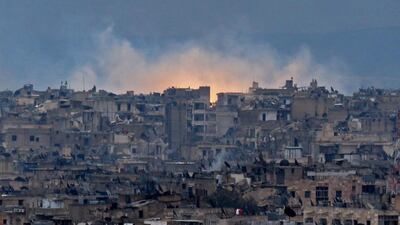Syrian journalist Zouhir Al Shimale has been helping The National tell the story of civilians trapped by a total siege in rebel-held areas of eastern Aleppo. But Zouhir did not just report on the siege; he lived it. Now, with the majority of east Aleppo captured by government forces, and rebel forces negotiating a withdrawal, Zouhir is one of the thousands of civilians trying to leave Aleppo as evacuation efforts get under way. This is what he wrote in November, as the rebel defeat looked increasingly certain.
EAST ALEPPO // I never thought things would end up like they have today.
We’ve been living under siege for nearly three months and food is running out. My friend was smart enough to stockpile some lentils and rice before the siege, so we have enough to eat one meal a day for now. Sometimes I go to sleep early if I’m hungry.
It’s unbelievable how it came to this point. I don’t believe the rebels will be able to break the siege. They can’t do very much at this point.
When the demonstrations against president Bashar Al Assad began in 2011, I was in university studying law. By the time they reached my campus in western Aleppo, I joined them and started struggling in school as I skipped classes to protest.
In March 2012, one year after the rebellion began, I was protesting against the government when the police attacked, firing their automatic weapons at us.
I tripped while running and they caught me as I lay on the ground. They took me to jail along with other protesters, beating me on the bus on the way there. Some were beaten so bad their arms or noses were broken. They called us terrorists and told us we would die in jail.
When we arrived, I was held in a small basement room with 50 other men. There wasn’t even room to sit down.
They let me go after two days as the jail was getting overcrowded, but I tried to keep a low profile as I continued with my studies.
After graduating from university, I started working at a medical facility in the rebel-held east to help the people there.
I worked hard to improve my English, listening to broadcasts on my phone for hours at a time and watching films whenever I could. I watched The Lord of the Rings 20 or 30 times, it helped me a lot. When my English was good enough to converse with native speakers, I started working to help foreign journalists tell stories about the war.
There have been a lot of bad days in the war.
Once, my street was hit by two barrel bombs. They landed about 100 metres from my house. I rushed down to the street to see the casualties and helped recover the bodies of children from the rubble. As we were carrying a boy, part of his skull slid off. Another had his head crushed. We loaded them into the ambulance even though they were dead.
Six months ago, I was buying food at a shop in my neighbourhood when a barrel bomb landed 50 metres away. Again, I ran towards the scene.
As I ran, another barrel bomb hit the store that I was in, killing 10 people inside. I was the only person there who survived, but I suffered shrapnel wounds in my back and right leg.
It’s getting harder every day to work here in this war zone. Many people don’t like to be in the spotlight and be filmed or interviewed because they don’t like journalists.
This hate has been growing in Middle Eastern society as the war crimes and massacres continue without the media’s coverage changing anything.
But this work has changed me a lot. My coverage of the war over the last year has opened my eyes to all the horrors of this catastrophic story. It will stick in my mind forever.
Whenever I do interviews, I think that my life could be threatened at any time. It doesn’t make me scared, it just makes me rethink things: Is it worth it to do this, to lose your life?
I can’t answer this question, but something drives me to do it anyway.
The terrible circumstances of the lives here must be told. And I’m just doing it, without taking into consideration any of the risks I am involved in.
As l long as I am alive, as best I can I want people to know the real stories from the ground.
Though at some point, it seems pointless and useless as things aren’t changing and no one cares.
But then I remember that I am not doing this to make the politicians change their policies here. It’s for those people who are interested, for those who want to have a clear view of the city’s situation and what’s happening to ordinary people caught in the crossfire of this terrible war.
__________________________________
Aleppo under siege
■ No roads to safety for terrified east Aleppo residents
■ Life in east Aleppo goes from bad to worse as desperate civilians loot food stores
■ Bare shelves and rising prices in besieged eastern Aleppo
■ Family's struggle for survival inside besieged Aleppo
foreign.desk@thenational.ae

